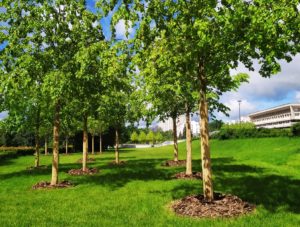
How can you rehydrate your trees after a drought? Try these methods.
Summer’s intense heat can take a toll on your trees, causing them to show signs of dehydration. At Scientific Plant Service, we want to help you maintain healthy and vibrant trees throughout the season. Here are a few signs of dehydration and some methods you can use to help trees that are showing signs of dehydration during the summer.
Signs That a Tree Is Dehydrated
Recognizing the signs of dehydration is the first step in addressing the issue. Keep an eye out for the following symptoms:
- Wilting During the Day: Leaves that droop or wilt, especially during the hottest part of the day, indicate that the tree is struggling to take up enough water.
- Discolored Leaves: Leaves turning yellow or brown, particularly around the edges, are a clear sign of water stress.
- Irregular Seasonal Changes: Premature leaf drop or changes in leaf color out of season can signal dehydration.
- Bare Branches: Branches with sparse foliage or areas where leaves are absent are red flags.
- Cracking Bark: Bark that splits or cracks can result from the tree’s inability to transport water effectively.
How to Help Dehydrated Trees
Addressing dehydration involves a combination of proper watering techniques and maintenance practices to restore your trees’ health.
Deep Watering
Deep watering is one of the most effective ways to rehydrate a tree. This method ensures that water reaches the tree’s root zone rather than only wetting the surface. Here’s how to do it:
- Consistent Watering: Water deeply once or twice a week rather than daily. This encourages roots to grow deeper into the soil. Tree roots need air as much as water.
- Water Amount: Apply enough water to moisten the soil to a depth of 12-18 inches. You may use a soil probe to check moisture levels.
- Soaker Hoses and Drip Irrigation: Utilize soaker hoses or drip irrigation systems to apply water directly to the root zone. This method reduces water wastage and ensures efficient absorption.
Mulching
Mulching helps retain soil moisture, regulate soil temperature, and reduce water competition from weeds. Apply a 2 inch layer of organic mulch, such as wood chips or shredded bark, around the base of the tree. Ensure the mulch extends out to the drip line and avoid piling it against the trunk to prevent rot.
Pruning
Remove any dead or damaged branches to reduce the tree’s water requirements and allow it to focus on rehydrating healthy parts. Pruning also improves light penetration and air circulation, aiding the tree’s recovery.
Fertilization
Proper fertilization can support a tree’s health and improve its ability to absorb water. Use a slow-release, balanced fertilizer to provide essential nutrients without overstimulating growth. Avoid fertilizing during extreme heat, as this can stress the tree further.
Soil Improvement
Incorporating organic matter, like compost, into the soil around the tree can improve root growth and water absorption. Application of a quality soil surfactant can help the trees’ root zones accept water rather than running off.
Monitoring and Maintenance
Monitor your trees for signs of dehydration and other stress indicators. Maintain a consistent watering schedule, especially during dry spells. Keep the area around the tree free of competing plants and weeds that can absorb moisture meant for the tree.
By implementing these strategies, you can effectively rehydrate your trees and help them stay healthy and resilient during the summer. At Scientific Plant Service, we are dedicated to helping you maintain a thriving landscape. For more expert advice or assistance with your tree care needs, please contact our team of experienced tree experts.
Scientific Plant Service Is Your Go-To Source In Landscape Healthcare
Scientific Plant Service, located in Baltimore, is a privately owned corporation, chartered in Maryland in 1957 by Frank J. Burke. We started as a full-service Arborists specializing in the care of shade trees and ornamental shrubs, but today we are a Lawn Care company that is a huge part of the community. From aquatic environments and snow management to deer and mole control, SPS has services tailored specifically for your lawn and landscape.
We offer services in Maryland, Washington, DC, and Virginia, including: Harford, Baltimore, Carroll, Frederick, Howard, Anne Arundel, Montgomery, Prince Georges, Talbot, Queen Anne’s, Calvert counties in MD, as well as Loudoun County, Fairfax County, Arlington, Alexandria, and Falls Church in VA. For more information, contact us online, or call us at 410-321-0970. Be sure to follow us on Facebook, Twitter, LinkedIn, Instagram, and Pinterest.

